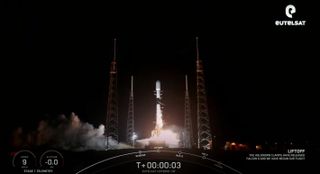SpaceX launched a communications satellite and landed a rocket on a ship at sea early Saturday (Oct. 15), just hours after bringing four astronauts home from the International Space Station.
A Falcon 9 rocket carrying Eutelsat's Hotbird 13F satellite lifted off from Florida's Cape Canaveral Space Force Station on Saturday at 1:22 a.m. EDT (0522 GMT), at the very end of the mission's nearly two-hour window.
The Falcon 9's first stage returned to Earth just under nine minutes after launch, landing on SpaceX's Just Read the Instructions droneship, which was stationed in the Atlantic Ocean off the Florida coast.
Related: 8 ways that SpaceX has transformed spaceflight

It was the third launch and landing for this particular first stage, according to a SpaceX mission description. The booster also helped launch SpaceX's CRS-24 cargo mission to the International Space Station in December 2021 and one batch of the company's Starlink internet satellites.
The Falcon 9's upper stage, meanwhile, continued carrying Hotbird 13F to orbit. The satellite — which was built by Airbus Defense and Space and will be operated by France-based Eutelsat — was deployed on schedule about 36 minutes after liftoff.
Hotbird 13F is bound for geostationary orbit, about 22,300 miles (35,900 kilometers) above Earth. The spacecraft and its twin, Hotbird G, are slated to replace three other Hotbird spacecraft, which currently provide 1,000 television channels to more than 160 million homes in Europe, North Africa and the Middle East, according to Eutelsat. Hotbird G will also ride a Falcon 9 to orbit, perhaps as early as next month.
Get the Space.com Newsletter
Breaking space news, the latest updates on rocket launches, skywatching events and more!
Saturday morning's liftoff came less than nine hours after SpaceX's Crew-4 astronaut mission for NASA returned to Earth from the space station. Crew-4's Dragon capsule, named Freedom, splashed down off the coast of Jacksonville, Florida, on Friday (Oct. 14) at 4:55 p.m. EDT (2055 GMT).
Editor's note: This story was updated at 2:15 a.m. EDT on Oct. 15 with news of successful launch, rocket landing and satellite deployment.
Mike Wall is the author of "Out There" (Grand Central Publishing, 2018; illustrated by Karl Tate), a book about the search for alien life. Follow him on Twitter @michaeldwall. Follow us on Twitter @Spacedotcom or on Facebook.
Join our Space Forums to keep talking space on the latest missions, night sky and more! And if you have a news tip, correction or comment, let us know at: community@space.com.

Michael Wall is a Senior Space Writer with Space.com and joined the team in 2010. He primarily covers exoplanets, spaceflight and military space, but has been known to dabble in the space art beat. His book about the search for alien life, "Out There," was published on Nov. 13, 2018. Before becoming a science writer, Michael worked as a herpetologist and wildlife biologist. He has a Ph.D. in evolutionary biology from the University of Sydney, Australia, a bachelor's degree from the University of Arizona, and a graduate certificate in science writing from the University of California, Santa Cruz. To find out what his latest project is, you can follow Michael on Twitter.
